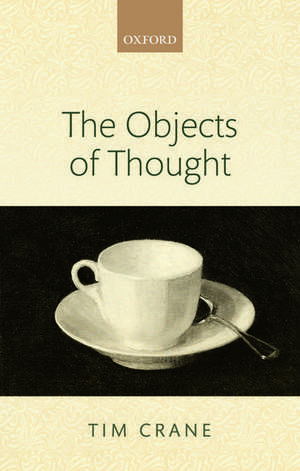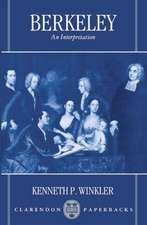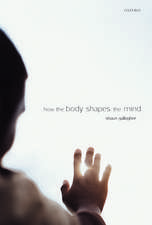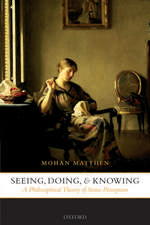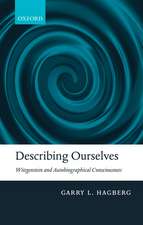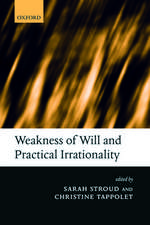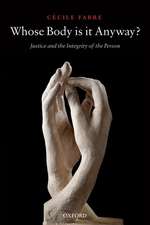The Objects of Thought
Autor Tim Craneen Limba Engleză Paperback – oct 2015
Preț: 226.04 lei
Preț vechi: 256.91 lei
-12% Nou
Puncte Express: 339
Preț estimativ în valută:
43.25€ • 45.28$ • 35.79£
43.25€ • 45.28$ • 35.79£
Carte tipărită la comandă
Livrare economică 25-31 martie
Preluare comenzi: 021 569.72.76
Specificații
ISBN-13: 9780198748045
ISBN-10: 0198748043
Pagini: 208
Dimensiuni: 142 x 216 x 11 mm
Greutate: 0.25 kg
Editura: OUP OXFORD
Colecția OUP Oxford
Locul publicării:Oxford, United Kingdom
ISBN-10: 0198748043
Pagini: 208
Dimensiuni: 142 x 216 x 11 mm
Greutate: 0.25 kg
Editura: OUP OXFORD
Colecția OUP Oxford
Locul publicării:Oxford, United Kingdom
Recenzii
The Objects of Thought is a rich book, full of ideas and arguments. Making room for non-existent objects is a complicated business, and Crane covers a lot of ground very clearly. So this is a great book for anyone who wishes to get a sophisticated overview of the debate about non-existent objects. Because I have only been able to discuss a very small part of this complicated issue, my suggestion is to go out and read the book.
Ambitious, ingenious, and lucid . . . Crane's excellent book . . . has all sorts of interesting and insightful things to say about metaphysics, language, and intentionality. There is a great deal to be learned about these things from The Objects of Thought, whether or not one ultimately agrees with the details of Crane's positive view. Crane also has a fluid clear style that makes his book a pleasure to read. So I recommend it very warmly, not merely to those interested in the nonexistent, but to all those interested in metaphysics and intentionality.
His discussion throughout is both delightfully clear and eminently sensible--a quality that is rarer than it should be in view of much recent metaphysical extravagance in analytic philosophy . . . Tim's Crane's account is, all told, of considerable merit, and can be recommended to anyone concerned with the nature of the mind.
ingenious, full of insight and wonderfully clearly written.
elegant and original.
Crane offers a solid contribution to the debate on the problem of intentional inexistence . . . Highly recommended.
a rich book, full of ideas and arguments . . . Crane covers a lot of ground very clearly. So this is a great book for anyone who wishes to get a sophisticated overview of the debate about non-existent objects.
I recommend it highly to those interested not only in the specific matters with which it deals, but also to philosophers of mind more generally.
Ambitious, ingenious, and lucid . . . Crane's excellent book . . . has all sorts of interesting and insightful things to say about metaphysics, language, and intentionality. There is a great deal to be learned about these things from The Objects of Thought, whether or not one ultimately agrees with the details of Crane's positive view. Crane also has a fluid clear style that makes his book a pleasure to read. So I recommend it very warmly, not merely to those interested in the nonexistent, but to all those interested in metaphysics and intentionality.
His discussion throughout is both delightfully clear and eminently sensible--a quality that is rarer than it should be in view of much recent metaphysical extravagance in analytic philosophy . . . Tim's Crane's account is, all told, of considerable merit, and can be recommended to anyone concerned with the nature of the mind.
ingenious, full of insight and wonderfully clearly written.
elegant and original.
Crane offers a solid contribution to the debate on the problem of intentional inexistence . . . Highly recommended.
a rich book, full of ideas and arguments . . . Crane covers a lot of ground very clearly. So this is a great book for anyone who wishes to get a sophisticated overview of the debate about non-existent objects.
I recommend it highly to those interested not only in the specific matters with which it deals, but also to philosophers of mind more generally.
Notă biografică
Tim Crane is Knightbridge Professor of Philosophy at the University of Cambridge, and a Professorial Fellow of Peterhouse College. He is the author of Elements of Mind: An Introduction to the Philosophy of Mind (OUP, 2001), and co-editor (with Katalin Farkas) of Metaphysics: A Guide and Anthology (OUP, 2004). He is the philosophy editor of the Times Literary Supplement, and the general editor of the Routledge Encylopedia of Philosophy. Crane is also a member (by election) of the Academia Europaea, on the editorial board of Mind and Language, and a member of the Analysis committee.
